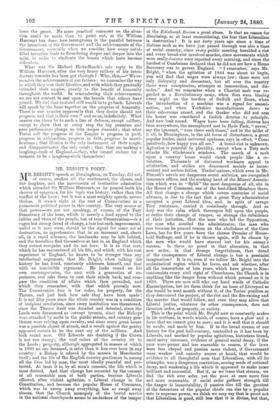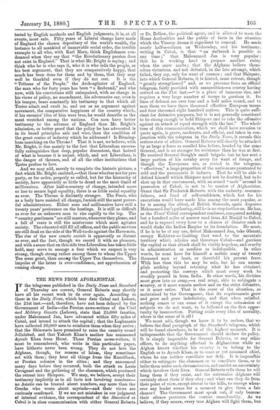MR. BRIGHT'S POINT.
MR. BRIGHT'S speech at Birmingham, on Tuesday, did not, of course, awaken all the excitement, the cheers, and the laughter, and the movements of instinctive admiration which attended Sir William Harcourt, as he poured forth his shower of epigrams, for his topic was history, rather than the conflict of the hour ; but it was a most weighty speech, never- theless. It struck right at the root of Conservatism as a permanent political power in this country. The very source of that power—we are not speaking, of course, of the Tory Democracy of the hour, which is merely a loud appeal to the foibles and vices of the people, but of true Conservatism—is a vague but strong dread of change, a fear lest each improvement, useful as it may seem, should be the signal for some act of destruction, an apprehension that in an incessant and, above all, in a rapid advance, the landmarks may be left behind, and the travellers find themselves at last in an England which they cannot recognise and do not love. It is to that fear, which he has encountered all his life, and which, with his vast experience of England, he knows to be stronger than any intellectual argument, that Mr. Bright, when talking the history he has lived, constantly addresses himself, and that with an irresistible argument. He looks round on his own contemporaries, the men with a generation of ex- perience, and asks them to cast their minds back, and com- pare the condition of affairs which then prevailed, and which they remember, with that which prevails now. The Conservative fear is for order, for property, for the Throne, and just look how safe they have been made ! It is not fifty years since the whole country was in a condition of incipient revolution, since every institution was threatened, since the Throne itself was dreaded and detested, since the Lords were denounced as corrupt tyrants, since the Bishops were attacked by mobs in the public streets, and country gen- tlemen were relying upon cavalry, and since every great house was a possible object of attack, and a revolt against the gentry appeared certain to be the next cry of the millions. And look round now. Old Liberals are doubting if the Crown is not too strong ; the real rulers of the country sit in the Lords ; property, although aggregated in masses of which in 1830 no one dreamed, is safer than it has ever been in any country ; a Bishop is adored by the masses in Manchester itself ; and the life of fhe English country gentleman is, among all the lives led by man, the most ideally peaceful and pro- tected. At least it is, by all men's consent, the life which is most desired. And that change has occurred by the consent of all reasonable men of both parties, because Liberals effected, after violent agitation, a Liberal change in the Constitution, and because the popular House of Commons, which was to sweep away everything, has so swept away abuses, that the Church monopoly of the burial service in the national churchyards seems to on-lookers of the temper of the Edinburgh Review a great abuse. Is that no reason for dismissing, or at least reconsidering, the fear that Liberalism is destructive I It is not forty years ago since a time of distress such as we have just passed through was also a time of social anarchy, since every public meeting heralded a riot and every bread-riot involved murder, since movements which were really eineutes were reported every morning, and since the hardest of Cumbrians declared that he did not see how a Home Secretary was to govern England. " I remember," says Mr. Bright. " when the agitation of 1844 was about to begin, you will find that wages were always low ; there were not only disloyalty and discontent, but all over the country there were conspiracies,- attempts at insurrection, and dis- order." And we remember when a Chartist mob was re- garded as a Revolutionary army, when fires were blazing every night on the borders of Suffolk and Essex, when the introduction of a machine was a signal for assassi- nation, and when Yorkshire manufacturers drove to their sale-rooms armed, and the Quaker who did not arm his house was considered a foolish devotee to principle. And now look round. Wages have been falling, distress has been everywhere, the unemployed met in Hyde Park, " never," say the ignorant, " were there such times," and in the midst of it all, in Birmingham, in the old focus of disturbance, a great popular leader, amid universal applause. says in effect, " Com- paratively, how happy you all are." A bread-riot is unknown. Agitation is peaceful to placidity, except when a Tory mob attacks Mr. Gladstone's windows. The march of a mob upon a country house would shock people like a re- volution. Thousands of distressed workmen appeal to arbitration, and strikes are denounced mainly as incon- venient and useless follies. Trades'-unions, which even in Mr. Disraeli's novels are dangerous secret societies, are recognised insurance offices, and the working head of the Miners' Associa- tion which was in "Sybil" the most dangerous of all, sits in the House of Commons, one of the best-liked Members there. All that change, a change which covers centuries of social advance, is due to the fact that a great Tory administrator accepted a great Liberal idea, and, in spite of savage Tory resistance, carried it resistlessly through. And so deep was the calm which thereupon fell upon the people, so entire their change of temper, so strange the subsidence of their irritation, that the man who led the Opposition, the man who assailed the administrator, the man who rose because he poured venom on the abolishers of the Corn Laws, has for five years been the chosen Premier of House- hold Suffrage, and if he is chosen again, will be chosen by the men who would have starved but for his enemy's success. Is there no proof in that alteration, in that new order, in that strange forgetfulness, that dread of the consequences of Liberal change is but a pessimist imagination ? It is so, even if we follow Mr. Bright into the ecclesiastical region which he loves, and ask whether, after all the innovations of late years, which have given to Non- conformists every civil right of Churchmen, the Church is in anything like the danger from without which pressed on it in 1830. There are men still who say hard words of Catholic Emancipation, but let them think for an hour of Liverpool as she would be next month without it, of the Tories' position as they denounced the project, of the riot and the fire-raising and the murder that would follow, and even they may allow that Liberal justice, whatever its other consequences, does not threaten order, or property, or society.
This is the point which Mr. Bright now so constantly makes in his orations, in words which, of course, have a glow and a force that we cannot give to ours ; and it is well that it should be made, and made by him. If in the broad stream of our history for the past half-century, controlled as it has been by Liberals, and marked by popular agitations, historians found, amid many successes, evidence of general social decay, if the poor were poorer and less amenable to reason, if the laws were less obeyed and passion more violent, if Government were weaker and anarchy nearer at hand, that would be evidence to all thoughtful men that Liberalism, with all its triumphs, was a dangerous conviction, sowing seeds of national decay, and weakening a life which it appeared to make more brilliant and successful. But if, as we trace that stream, we find the rich ever safer, yet the poor at once more free and more reasonable, if social order gathers strength till the danger is immutability, if passion dies till the greatest of the detractors of the popular chiefs can rise by a popular vote to supreme power, we think we may say that is proof not that Liberalism is good, still less that it is divine-, but that, tested by English methods and English judgments, it is, at all events, most safe. Fifty years of Liberal change have made of England the chosen depositary of the world's wealth, the instance to all mankind of immovable social order, the terrible example to all who, with Karl Marx, think Englishmen con- demned when they say that "the Revolutionary passion does not exist in England." That is what Mr. Bright is saying ; and think who he is who says it, who it is who tells the people, as his best argument, that they are comparatively happy, that much has been done for them and by them, that they may well be thankful even if they do not rest. It is the " Tribune of the People," the Arch-agitator of England, the man who for forty years has been " a firebrand," and who now, with his convictions still unimpaired, with no change in his views of policy, no amendment, his adversaries say, even in his temper, bears constantly his testimony to that which all Tories admit and exult in, and use as an argument against ' movement, the comparative happiness of the country which, if his enemies' idea of him were true, he would describe as the most wretched among the nations. Can men have better testimony to the advance of England than Mr. Bright's admission, or better proof that the policy he has advocated is in its broad principles safe and wise, than the condition of the great centre of industry which he addressed Is Birming- ham marching on the Throne ? That it is not, we believe, with Mr. Bright, is due mainly to the fact that Liberalism success- fully extinguishes that deep, popular discontent, that hatred of what is because it is unjust, which, and not Liberalism, is the danger of thrones, and of all the other institutions that Tories profess to love. And we may add, merely to complete the historic picture, a fact which Mr. Bright omitted,—that those who fear not for pro- perty, or for order, properly so called, but for the hierarchy of society, have apparently as little to dread as the most timid of millionaires. After half-a-century of change, intended more or less to secure legal equality, there is as little social equality as ever. The Throne is distinctly stronger. The Peers, who as a body have resisted all change, furnish still the most power- ful administrators. Eldest sons and millionaires have still a twenty years' preference on the hustings. It is still as difficult as ever for an unknown man to rise rapidly to the top. The "country gentlemen" are still masters, whenever they please, and a fall of rents is still the misfortune which most agitates society. The educated still fill all offices, and the public services are still dead on the side of the Well-to-do against the Have-nots. The rise of the new couche sociale is apparently as distant as ever, and the fact, though we record it with no pleasure, and with a sense that on this side true Liberalism has taken little hold, may serve to assuage a fear which we suspect is very strong, though strong rather among those to whom the Upper Ten seem great, than among the Upper Ten themselves. The impulse of the latter is over-confidence, not apprehension of coming change.



































 Previous page
Previous page